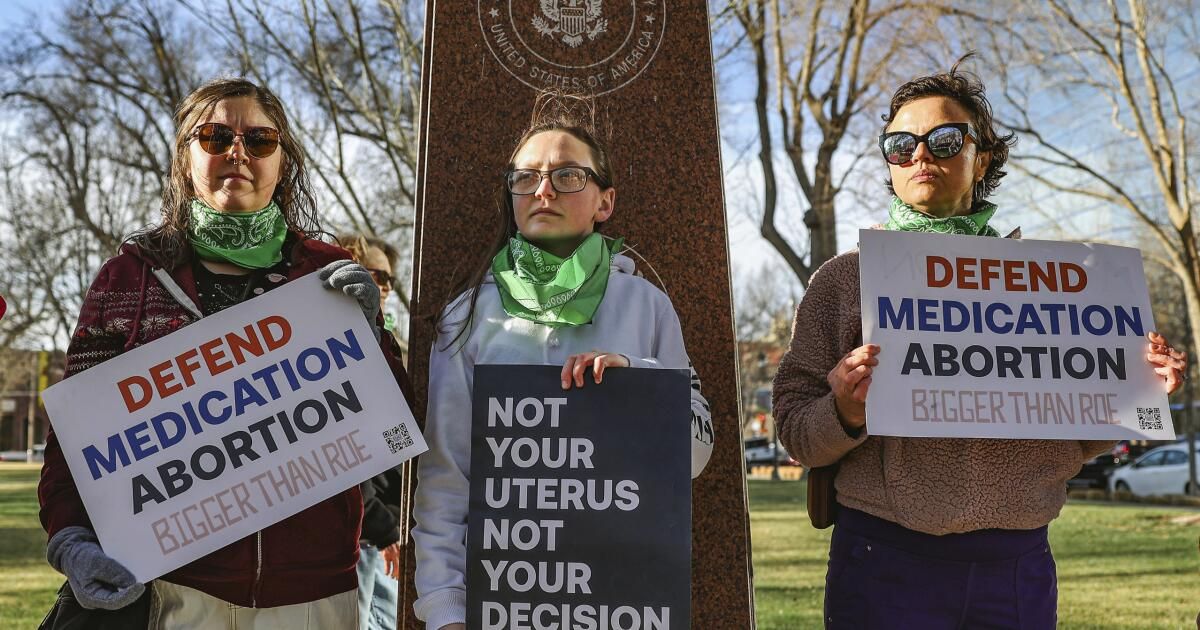The Supreme Court on Thursday dismissed a conservative Christian group's claim that the abortion drug used by more than five million American women is unsafe and should be taken off the market.
In a 9-0 decision, the justices said these anti-abortion activists had no standing to sue. And they said conservative Texas judges had no reason to overturn Food and Drug Administration regulations that allow mifepristone pills to be delivered by mail.
But since the court dismissed the case, the decision does not prevent other abortion advocates from filing a similar lawsuit against the FDA, with different plaintiffs.
“Plaintiffs have sincere legal, moral, ideological, and political objections to elective abortion and the FDA's lax regulation of mifepristone,” Justice Brett M. Kavanaugh wrote for the court's unanimous vote. “But under Article III of the Constitution, those types of objections alone do not establish a justiciable case or controversy in federal court. In this case, the plaintiffs have failed to demonstrate that the FDA's relaxed regulatory requirements would likely cause them to suffer harm. For that reason, federal courts are the wrong forum to address plaintiffs' concerns about the FDA's actions.”
Last year, the justices, by a vote of 7-2, blocked lower court rulings that would have made it harder for women to get the pills. Justices Neil M. Gorsuch, Amy Coney Barrett and Kavanaugh, the three Donald Trump appointees who had voted to overturn abortion rights, refused to join anti-abortion doctors seeking to restrict the use of abortion pills.
Justices Clarence Thomas and Samuel A. Alito Jr. dissented last year but joined in Thursday's ruling holding that anti-abortion doctors had no standing to sue.
The anti-abortion doctors who sued do not prescribe abortion pills and do not perform abortions. However, they argued that they should have standing because they could be required to perform an abortion if they were on duty in an emergency room when a patient arrived in distress after taking the abortive drug.
Kavanaugh said this made-up example does not reflect reality.
“Not only as a matter of law but also as a matter of fact, federal conscience laws have protected pro-life doctors since the FDA approved mifepristone in 2000,” he wrote. “Plaintiffs have not identified any cases in which a physician was required, despite conscientious objections, to perform an abortion or provide other abortion-related treatment that violated the physician's conscience.”
Abortion rights advocates said they were relieved by the outcome.
“I am both relieved and angry about this decision,” said Nancy Northup, president of the Center for Reproductive Rights. “Thank God the Supreme Court rejected this unjustified attempt to restrict access to medication abortion, but the fact is that this baseless case should never have gone this far.”
“We're relieved that the Supreme Court hasn't taken the bait, but unfortunately we know this is far from the end of the road,” said Jennifer Dalven, director of the ACLU's Reproductive Freedom Project. “Although the court refused to allow these particular people to bring this case, anti-abortion politicians are waiting in the wings to try to continue pushing this case before an extremist judge in Texas in an effort to deny people access to health care.” medical abortion.”
National medical groups also applauded the result.
The American Medical Association. said that “efforts to challenge the FDA's scientific judgment and roll back access to mifepristone were based on a false case that…relied on speculative accusations and ideological claims to undermine decades of rigorous scientific reviews showing that the drug “It is highly safe and effective for both the termination of pregnancy and the medical treatment of spontaneous abortion.”
National Right to Life said the decision did not resolve concerns about the drug's safety.
“Women remain unprotected from common abortion drug complications, such as bleeding, infection and failure to timely identify ectopic pregnancies that rupture,” said Carol Tobias, president of the group. “While the abortion pill remains legal, we look forward to continuing this battle to restore safety precautions.”
It is not clear who might have standing to sue, but lawsuits against a drug or other medication often begin with patients who complain of having suffered serious, unexpected complications.
In 2000, the FDA approved the use of mifepristone as safe and effective for terminating an early pregnancy. The pills are usually used in combination with a second medication, misoprostol.
In recent years, the agency relaxed its regulations for dispensing the pills. He did so based on studies that showed serious complications were “extremely rare.” Under the new rules, pregnant women could fill a prescription through telemedicine and receive the pills at a pharmacy or by mail. And they could use the drug during 10 weeks of pregnancy, compared to seven weeks earlier.
The Guttmacher Institute reported that abortion drugs were used in 63% of abortions in the United States last year.
Thursday's decision does not change the law in states where abortions are illegal.
Shortly after the Supreme Court struck down the right to abortion in Dobbs v. Jackson Women's Health Organization, Alliance Defending Freedom, a conservative Christian group, filed a lawsuit in Amarillo, Texas, requesting the repeal of the FDA's approval of mifepristone. The plaintiffs were doctors and other health activists from across the country who oppose abortion and maintain that the drugs are unsafe.
Plaintiffs generally have to prove that a federal law harmed them personally to have standing to sue. These doctors did not perform abortions or dispense the medications, but they maintained that at least some of the group members could be on call in the future in an emergency room when a patient arrived with complications after taking the abortion pills.
The group filed suit in Amarillo, knowing that the case would go before U.S. District Judge Matthew Kacsmaryk, a Trump appointee and Christian legal activist before his appointment.
As predicted, Kacsmaryk issued a sweeping ruling last year. He decided that anti-abortion activists had standing to sue and ordered the FDA to suspend approval of the drugs.
A few weeks later, the U.S. Court of Appeals for the Fifth Circuit agreed to limit Kacsmaryk's ruling. By a 2-1 vote, the appeals court said it was too late to undo the drug's approval in 2000, but not too late to overturn FDA regulations that since 2016 have made it easier for women to obtain the pills.
The Biden administration's attorney general, Elizabeth B. Prelogar, appealed to the Supreme Court, calling the case a first.
He said, “This is the first time a court has restricted access to an FDA-approved drug by questioning the FDA's expert judgment on the conditions required to ensure safe use of that drug.”












